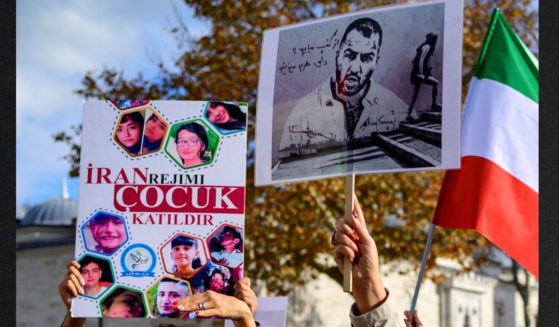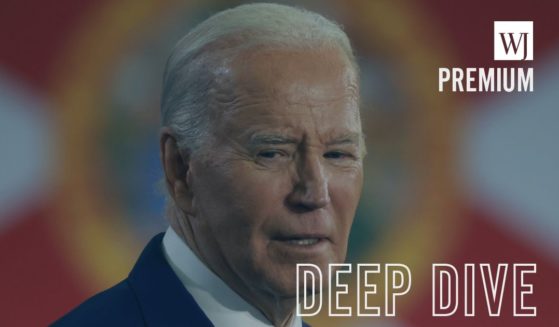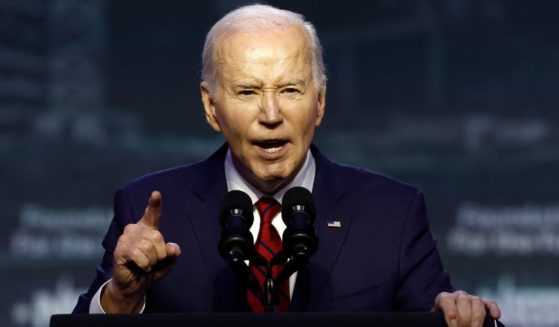As Afghanistan Burns, Biden Keeps Pushing to Close Prison That Held World's Most Dangerous Terrorists
When the so-called Taliban Five were released from the American military prison at Guantanamo Bay, Cuba, in 2014, traded for the freedom of captured U.S. Army soldier Bowe Bergdahl, intelligence officials labeled them the “hardest of the hardcore.”
The administration of former President Barack Obama still thought this was a worthwhile trade.
Reports now say one of the Taliban Five may have been behind the plotting of the terrorist group’s return to power in Afghanistan. Furthermore, U.S. intelligence says 229 former Gitmo inmates are known or suspected to have returned to active terrorism after they were released, according to a declassified U.S. intelligence report from December.
President Joe Biden still wants to close the military prison where the most hardened terrorists and terror suspects in the world are kept. And, at least before the fall of Afghanistan, he was hoping to do it quickly.
According to a June 9 report from NBC News, the Biden administration was trying end what NBC called a “long-standing legal and human rights morass before the 20th anniversary of the terrorist attacks of Sept. 11, 2001.”
The issue had been proceeding under the radar, officials said, for fear there would be blowback.
“They don’t want it to become a dominant issue that blows up,” NBC quoted an anonymous “former senior administration official” as saying. “They don’t want it to become a lightning rod. They want it to be methodical, orderly.”
Aside from the symbolic Sept. 11 date for progress to be made — coincidentally, the same symbolic date the Biden administration originally set for the withdrawal of U.S. forces from Afghanistan — there was no timeline behind when the prison would be closed, except that the aim was to have it done by the end of Biden’s first term.
“The administration hopes to transfer a handful of the remaining terrorism suspects to foreign countries, the people familiar with the discussions said, and then persuade Congress to permit the transfer of the rest — including 9/11 suspects — to detention on the U.S. mainland,” NBC News reported.
Closing the prison quickly — or at all — might have just gotten a lot more tricky thanks to the disastrous events in Afghanistan and the declassified Office of National Intelligence report on recidivist Gitmo detainees.
The report, declassified Dec. 18, 2020, was uploaded to the website of the Office of the Director of National Intelligence on April 5. In it, the Office of National Intelligence said that 125 former detainees were confirmed to have reengaged in terrorism, while another 104 were suspected of doing so.
Of these, 151 former detainees — 66 percent — hadn’t been recaptured at the time of the report. Forty-one were believed to be dead and 37 were in foreign custody, the report stated.
It also noted that transfers to third countries presented potential dangers.
“Based on trends identified during the past 17 years, we assess that some detainees currently at GTMO will seek to reengage in terrorist or insurgent activities after they are transferred,” the report stated.
“Transfers to countries with ongoing conflicts and internal instability as well as recruitment by insurgent and terrorist organizations could pose an increased risk of reengagement.
“While enforcement of transfer conditions probably has deterred many former detainees from reengagement, some detainees determined to reengage have and will do so regardless of any transfer conditions, albeit at a lower rate than if they were transferred without conditions.”
And some of the detainees who have been “determined to reengage” have done so at pretty significant levels.
Take Khairullah Khairkhwa. As the U.K. Daily Mail noted, he was one of the five Talibanis who were traded for Bowe Bergdahl, who walked off his post in Afghanistan as an Army private, captured by the Taliban and held for five years. (Bergdahl was promoted to sergeant in the intervening years.)
None of the men who were traded were low-level terrorists. All were commanders in the Taliban, even though Obama assured Americans that their transfer to the Persian Gulf nation of Qatar would prevent them from causing damage in Afghanistan, as investigative reporter Paul Sperry wrote in the New York Post last week.
Qatar was also where peace talks were conducted between the United States and the Taliban, however — and Khairkhwa had a hand in negotiating the deal with the Trump administration that ended with the United States drawdown in Afghanistan.
According to the Sperry, Khairkhwa sat at the same table as Biden’s envoy to Afghanistan, Zalmay Khalilzad, during talks in Moscow to finalize the terms of the withdrawal.
And no one could accuse Khairkhwa of having moderated over the years: “I started jihad to remove foreign forces from my country and establish an Islamic government, and jihad will continue until we reach that goal through a political agreement,” Khairkhwa said during the summit, according to Sperry.
Furthermore, members of the Obama-Biden administration had received intelligence reports that other members of the Taliban Five had also made contacts with insurgents back in Afghanistan and promised to return there to fight U.S. soldiers.
Now, Afghanistan burns. Good work.
Other Guantanamo alumni have become top Taliban leaders. Mullah Zakir, released in 2007, is one of the insurgent group’s leading military chiefs. Gholam Ruhani, who was at Gitmo from 2002 to 2007, was seen, rifle in hand, at a news conference celebrating the Taliban’s capture of Kabul, according to the U.K. Daily Mail.
“State Department documents seen by DailyMail.com confirm that Ruhani — detainee number 3 — was one of the very first prisoners at Guantanamo Bay but record that he spent five years there, from 2002 to 2007,” the paper reported Monday.
“The files also reveal that Ruhani secured his eventual freedom by telling an administrative review board that he was a ‘simple shopkeeper’ who ‘helped Americans.'”
He also claimed he’d joined the Taliban because it was a “survival necessity” and had never heard of al Qaida prior to the 9/11 attacks., the Daily Mail reported. He told officials that he merely wanted to “assist his father, who is sick, in operating the family appliance store in Kabul.”
One hopes he got in a plug for the store while he was at the news conference. After all, he had the very definition of a captive audience.
So, unfortunately for the Biden administration and the Democratic Party — to quote that unnamed administration official who talked to NBC News about Biden’s pledge to close the prison at Guantanamo Bay — this is going to be “a dominant issue that blows up,” if just because Afghanistan already is.
Transferring prisoners to third countries is a fatal mistake, as the case of Khairkhwa proves in the starkest possible terms.
And after the scenes out of Kabul, closing Gitmo quietly isn’t an option anymore.
Truth and Accuracy
We are committed to truth and accuracy in all of our journalism. Read our editorial standards.












